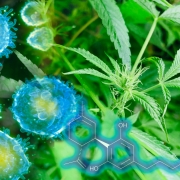CBD and Autoimmune Disease: What Do the Studies Say?
If you’re among the 23 – 50 million Americans living with an autoimmune disease, you probably know the frustration of being at war with your own body.
Autoimmune disease occurs when your immune system goes into overdrive, attacking healthy organs and tissues instead of bacteria and viruses. This can lead to inflammation, pain, and organ damage, and can take the form of chronic conditions like lupus, rheumatoid arthritis, Graves’ disease, type 1 diabetes, multiple sclerosis, and celiac disease. Scientists have discovered at least 80-100 autoimmune diseases, with a growing number of people affected each year.
Currently there is no cure for autoimmune conditions. Instead, mainstream medicine has focused on treating the symptoms with steroids, anti-inflammatories, pain pills, and other pharmaceuticals. Some autoimmune patients even receive chemotherapy or intravenous biologics to suppress their immune system and decrease the severity of their symptoms.
“The only thing tough enough to kick my butt is me.”
— Unknown
In recent years, an increasing number of autoimmune patients have turned to natural healing methods, including clean and plant-based diets, herbal supplements, and CBD. With the loosening of prohibitions on cannabis and hemp, financing has been poured into researching the effect of CBD on autoimmune disease.
Scientists are just beginning to understand the method by which cannabinoids, including CBD, suppress overactive immune systems. CBD may act in a few different ways, by suppressing cytokine production in human immune cells, causing the death of certain immune cells, inhibiting immune cell propagation, and suppressing T-cell production memory.
Initial studies indicate CBD may have a few helpful qualities. This could have beneficial effects on a wide range of immune-mediated diseases, especially when the CBD is full-spectrum or whole plant and contains other cannabinoids, cannaflavins, and terpenes. All of these compounds work together synergistically through the “Entourage Effect.”
While research is ongoing, initial studies have identified two terpenes that may be of especial interest to the autoimmune community: (1) the spicy, peppery terpene known as “Beta-caryophyllene”, which is hypothesized to reduce inflammation by triggering our CB2 receptors, and (2) a lemony terpene called “myrcene”, which boasts anti-inflammatory qualities. MendCBD+ contains both of these terpenes, along with an array of minor cannabinoids and elevated levels of cannabigerol or CBG.
CBD Is an Adaptogen
Instead of working on a specific system or symptom, CBD triggers receptors that balance physiological processes, including immune system function. CBD is biphasic and may cause different results depending on your underlying issues and body chemistry. Research indicates that CBD may regulate immune activity down if it’s too active, and if the immune system is too slow, CBD may increase its activity. In this way CBD appears to modulate the immune system rather than suppressing it.
It’s thought that CBD works best in conjunction with a health diet and positive lifestyle choices. As always, we recommend you consult with your physician before embarking on any CBD regimen.
MendCBD+ does not support unverified claims that CBD is a magic cure for any illness. Instead, we invite everyone to view public research on CBD, documented by medical professionals and accredited institutions.
Sources:
Kaplan, B., et. al (2008, September 15) The Profile of Immune Modulation by Cannabidiol (CBD) Involves Deregulation of Nuclear Factor of Activated T Cells (NFAT), Biochem Pharmacol., Volume 76(6): 726-737. Retrieved on October 11, 2019 at https://www.ncbi.nlm.nih.gov/pmc/articles/PMC2748879/
Srivastava MD, Srivastava BI, Brouhard B (1998) Delta9 tetrahydrocannabinol and cannabidiol alter cytokine production by human immune cells. Immunopharmacology, Volume 40(3): 179–85.Retrieved on October 13, 2019 at https://www.sciencedirect.com/science/article/abs/pii/S0162310998000411
Rider, S., et. al (2010, May 20) Cannabinoid-induced apoptosis in immune cells as a pathway to immunosuppression, Immunobiology. Retrieved on October 13, 2019 at https://www.ncbi.nlm.nih.gov/pmc/articles/PMC3005548/
Elliot, D., et. al (2018, August 3) Cannabidiol Attenuates Experimental Autoimmune Enchephalomyelitis Model of Multiple Sclerosis Through Induction of Myeloid-Derived Suppressor Cells. Retrieved on October 13, 2019 athttps://www.ncbi.nlm.nih.gov/pmc/articles/PMC6085417/





